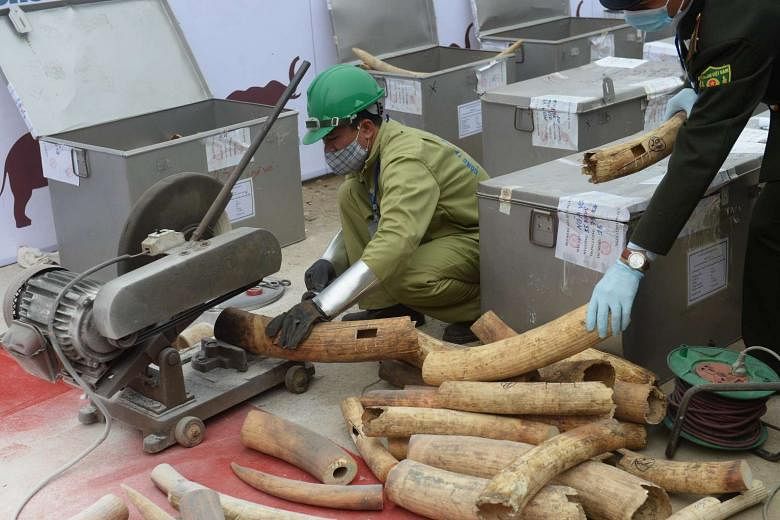THE HAGUE • A Vietnamese village has become "a supermarket for illegal wildlife trafficking", raking in millions of dollars, a special hearing was told yesterday.
The two-day public hearing in The Hague is laying out the findings of a year-long undercover investigation by the Wildlife Justice Commission set up last year.
The probe has provided "irrefutable evidence of an industrial-scale crime hub in... Nhi Khe in Vietnam", said the commission's executive director Olivia Swaak-Goldman, adding that "urgent, decisive action" was needed.
The commission has no power to bring charges, but hopes the hearing will push Vietnam and other countries to crack down on the global US$20 billion (S$28 billion) trade in wildlife poaching.
Five experts will set out recommendations today for more action.
But it seems Hanoi has already been spurred into action ahead of a major global conference on wildlife trafficking it is hosting this week.
Last Saturday, the Vietnamese authorities destroyed a stockpile of two tonnes of ivory and 70kg of rhino horn, which had been uncovered by the commission.
Former assistant US attorney for New York Marcus Asner, an adviser on wildlife trafficking to US President Barack Obama, said Nhi Khe had become "a supermarket for illegal wildlife", with "massive quantities of rhino horn for sale and huge quantities of elephant products" openly on display.
The commission says it has identified 51 people involved in the illegal trade in Nhi Khe, operating out of 16 shops around the small village. The names have been given to Hanoi.
But "justice has not been activated in this case by the authorities in Vietnam, despite months of discussions and clear and detailed evidence", said Mrs Swaak-Goldman.
During five return visits in 2015 and 2016, the undercover operation found US$53.1 million worth of parts from rhinos, elephants and tigers in Nhi Khe, just 17km south of the Vietnamese capital Hanoi.
There were parts from up to 907 elephants, 579 rhinos and 225 tigers. But there were also other dead animals for sale, including pangolins, bears, hawksbill turtles and helmeted hornbills. They were smuggled into the country mostly from Africa and were overwhelmingly destined for customers in China.
After a sale is agreed, business is then conducted on WeChat, the Chinese version of WhatsApp, with the buyers providing account details of Chinese banks for payment.
"What is most lacking is enforcement, and this is based on the absence of political will," said international judge Motoo Noguchi.
Undercover videos showed shopkeepers weighing piles of ivory and rhino horn. One elephant tusk was estimated at US$29,000 - a fortune in the country where the average monthly salary is US$210.
One woman trafficked an estimated US$2.2 million in products over 12 months from her mansion, with a brand new Mercedes outside, the commission's senior legal investigator Pauline Verheij told the hearing.
AGENCE FRANCE-PRESSE

